
The relentless crackdown on Falun Gong by Russia, fueled by its growing alliance with China, is an alarming testament to the erosion of religious freedoms and the strengthening of authoritarian regimes.
At a Glance
- Russia intensifies its crackdown on Falun Gong, reflecting its strategic alignment with China.
- A Russian court recently sentenced a Falun Gong practitioner to four years in prison.
- The U.S. State Department condemns Russia’s actions, citing a breach of religious freedom.
- The crackdown highlights the export of China’s repressive policies to allied states.
Russia’s Crackdown on Falun Gong
Russia’s intensified repression of Falun Gong, a spiritual practice originating in China, has raised international concern. This escalation coincides with Russia’s strategic partnership with China, which has seen Moscow increasingly align its domestic policies with Beijing’s priorities. In July 2025, a Moscow court handed down a four-year prison sentence to Natalya Minenkova, a 47-year-old Falun Gong practitioner, for her involvement in a local group deemed “undesirable.” This action underscores the broader trend of authoritarianism and the suppression of religious freedoms.
Falun Gong, known for combining meditation and moral philosophy, has faced persecution in China since 1999. The Chinese Communist Party (CCP) launched a campaign to eradicate the practice, branding it a “heretical organization.” This campaign has extended beyond China’s borders, with Russia becoming a notable ally in the suppression of Falun Gong. Russia’s legal framework, which allows for the banning of organizations labeled as “extremist” or “undesirable,” has been instrumental in the crackdown.
International Response and U.S. Condemnation
The United States has been vocal in its condemnation of Russia’s actions. The U.S. State Department has urged Russia to respect religious freedoms and cease its repression of religious minorities, specifically naming Falun Gong. Despite these calls, Russian authorities continue to justify their actions under the guise of anti-extremism laws. This situation reflects the growing influence of Chinese policies on Russian governance, as Moscow aligns more closely with Beijing’s domestic and foreign policy priorities.
Human rights organizations and international bodies have also criticized Russia’s crackdown on Falun Gong. They argue that this repression is part of a broader trend of authoritarianism and a direct result of Chinese influence. Scholars highlight the use of anti-extremism laws as a tool for political control and warn that the internationalization of China’s anti-Falun Gong campaign sets a dangerous precedent for transnational repression.
Implications for Religious Freedom and Human Rights
The repression of Falun Gong in Russia has significant implications for religious freedom and human rights. In the short term, it increases fear and suppression among practitioners, creating a chilling effect on other religious minorities. In the long term, it entrenches authoritarian legal practices and further aligns Russian and Chinese domestic policies. This alignment poses a threat to civil liberties and religious freedoms, as the export of China’s repressive practices becomes more pronounced.
Falun Gong practitioners in Russia face imprisonment, loss of livelihood, and social ostracism. The crackdown also affects other religious and civil society groups, which may face heightened scrutiny and repression. The erosion of religious freedom and civil liberties has broader social and political impacts, potentially affecting Russia’s international reputation and relations with Western democracies.
Sources:
Wikipedia – Persecution of Falun Gong
Wikipedia – Falun Gong outside mainland China












